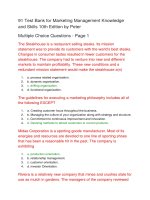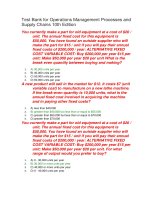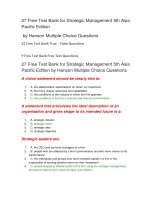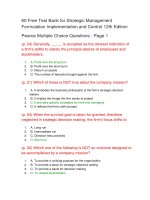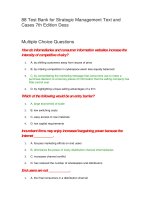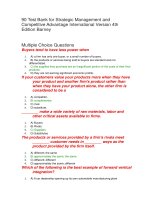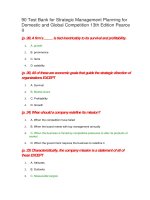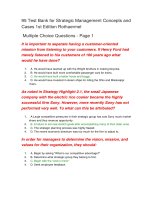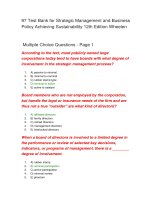Test bank for strategic management theory and cases an integrated approach 11th edition hill
Bạn đang xem bản rút gọn của tài liệu. Xem và tải ngay bản đầy đủ của tài liệu tại đây (96.24 KB, 16 trang )
Test Bank for Strategic Management Theory and
Cases An Integrated Approach 11th Edition Hill
Multiple Choice Questions
Which of the following statements is true about the
complementors?
1.
2.
3.
a. Their impact on industries was first recognized by Porter's five forces model.
b. They have little importance in high-technology industries.
c. They have the power to impact the sales of the industry to which they supply
complement products.
4. d. They tend to increase the sales of the industry they are supplying complements
to by producing fewer low
5. quality complement products.
6. e. They cannot gain enough power to extract profits from the industry to which
they supply complement products.
As an industry enters the decline stage:
1.
2.
3.
4.
5.
a. growth becomes negative.
b. rivalry among established companies usually decreases.
c. competitive pressures abate.
d. capacity reduces.
e. demand remains the same.
Which of the following industry structures consists of a large
number of small or medium-sized companies, none of
which is in a position to determine industry price?
1.
2.
3.
4.
5.
a. Fragmented industry
b. Consolidated industry
c. Oligopoly
d. Monopoly
e. Sector
Brand loyalty can be created by:
1.
2.
3.
4.
5.
a. minimal advertising.
b. not using patents to protect products.
c. cutting the costs for research and development.
d. emphasizing high product quality.
e. minimizing after-sales service
Which of the following statements is true about potential
competitors in an industry?
1.
2.
3.
a. They threaten the profitability of established companies.
b. They are usually encouraged by established companies.
c. They find it easier to enter an industry when the entry barriers are high.
4.
d. They find it easier to enter an industry when established companies have
economies of scale.
5. e. They usually have an absolute cost advantage over established companies.
An industry's buyers have high bargaining power when:
1.
2.
3.
a. they purchase in small quantities.
b. switching costs are low.
c. it is economically impossible for them to purchase an input from several
companies at once.
4. d. the supply industry depends upon buyers for a very small percentage of its total
orders.
5. e. the industry is a monopoly.
The competitive structure of an industry refers to the:
1.
2.
3.
4.
5.
a. number of market segments in the industry.
b. number and size distribution of companies in the industry.
c. number of consumers in the industry.
d. number of manufacturing plants in the industry.
e. number of products produced in the industry.
As an industry enters the shakeout stage:
1.
2.
3.
4.
5.
a. rivalry among companies declines.
b. demand grows at a high rate.
c. prices of products increase.
d. excess productive capacity emerges.
e. new entrants come into the market.
Entry barriers in embryonic industries tend to be based on:
1.
2.
3.
4.
5.
a. brand loyalty.
b. economies of scale.
c. absolute cost advantages.
d. regulatory advantage.
e. technological knowhow.
Which of the following statements is true about government
regulations in the context of entry barriers of an
industry?
1.
2.
3.
4.
5.
a. Goverrnnent deregulation in an industry results in significant reduction in
competition.
b. Goverrunent regulation has not constituted a major entry barrier for many
industries.
c. Falling entry barriers due to goverrnnent deregulation results in higher
competition and lower industry profit rates.
d. The threat of new entrants reduces when the goverrunent deregulates an
industry.
e. Companies that enjoy brand loyalty and have significant scale economies are
the ones who face major threat of competition due to goverrnnent deregulation.
Suppliers in an industry are most powerful when:
1.
2.
3.
4.
a. there are few substitutes for the products that they sell.
b. switching costs are low.
c. companies in the industry threaten to enter the suppliers' industry.
d. their profitability is significantly affected by the purchases of companies in a
particular industry.
5. e. they refrain from entering their customers' industry because oflack of resources.
The threat from potential competitors is greatest in the stage
of the industry life cycle.
1.
2.
3.
4.
5.
a. embryonic
b. growth
c. shakeout
d. maturity
e. decline
A sector refers to a group of:
1.
2.
3.
4.
5.
a. goverrnnent regulators.
b. closely related industries.
c. manufacturing plants of a company based in the same location.
d. business units owned by a single finn.
e. companies that manufacture similar products under different brand names.
The bargaining power of an industry's suppliers is greater
when:
1.
2.
a. the supply industry is fragmented.
b. switching costs are minimal for companies because oflittle difference among
products offered by different suppliers.
3. c. the industry buys in large quantities.
4. d. the product that suppliers sell has many substitutes and is not vital to the
companies.
5. e. the industry is not an important customer to the suppliers.
Economies of scale can arise from:
1.
2.
3.
a. cost reductions gained through decreased production.
b. high prices on bulk purchases of raw material inputs and component parts.
c. an advantage gained by spreading fixed production costs over a large
production volume.
4. d. increased spending on marketing and advertising activities.
5. e. poor production operations.
A group of firms manufactures writing implements such as
pens, pencils, and markers. This group should be
referred to as a(n):
1.
a. substitute.
2.
3.
4.
5.
b. market segment.
c. service provider.
d. regulator.
e. industry.
Mobility barriers:
1.
2.
3.
4.
5.
a. allow industries to change their strategy and compete in that strategic group.
b. inhibit the movement of companies between strategic groups in an industry.
c. inhibit companies from shifting between suppliers for the raw materials.
d. are factors that operate outside of an industry.
e. exclude the barriers to entry into a group and the barriers to exit from a
company's existing group.
A baking company has different product ranges like wholewheat pizzas for the diet-conscious and rich cookies
for children and youngsters. The company is catering
to different groups of customers known as:
1.
2.
3.
4.
5.
a. investors.
b. entrants.
c. sectors.
d. market segments.
e. substitutes.
Which of the following statements is true about rivalry in the
context of established companies?
1.
2.
3.
a. It significantly reduces the costs of established companies.
b. It squeezes profits out of an industry.
c. It enables companies to lower their spending on non-price-competitive
strategies.
4. d. It forces companies to reduce prices when it is less intense.
5. e. It is unaffected by the demand conditions of an industry.
Due to a recent relaxation in the pollution control laws by the
government, Alpha Motors has reduced the production
of its electric-powered cars. The company is
responding to a change in which of the following
macroenvironmental forces?
1.
2.
3.
4.
5.
a. J!Iacroeconomic
b. Demographic
c. Political and legal
d. Social
e. Global
Market segments are groups of:
1.
2.
3.
4.
5.
a. customers within a market that can be different from each other on the basis of
their distinct attributes and specific demands.
b. companies within a market that produce similar goods or services which are
close substitutes of each other.
c. companies that follow a similar business model and cater to the needs of similar
customers.
d. closely related industries.
e. large companies that are in a position to determine industry price.
The extent of rivalry among established companies is lowest
when:
1.
2.
3.
4.
5.
a. the industry's product is a commodity.
b. demand is growing rapidly.
c. exit barriers are substantial.
d. the industry is entering a decline stage.
e. the fixed costs are high.
A consolidated industry structure:
1.
2.
a. consists of a large number of small companies.
b. can be seen in agriculture, dry cleaning, health clubs, and real estate
brokerage.
3. c. consists of few companies that are in a position to determine industry price.
4. d. provides no scope for oligopoly to exist.
5. e. is characterized by low-entry barriers and commodity-type products.
Which of the following is NOT one of the factors in the
economic forces of the macroenvirornnent?
1.
2.
3.
4.
5.
a. Interest rates
b. Inflation
c. Cultural changes
d. Currency exchange rates
e. Economic growth rate
Which of the following is NOT a barrier to entry?
1.
2.
3.
4.
5.
a. Economies of scale
b. Brand loyalty
c. Absolute cost advantages
d. High customer bargaining power
e. High customer switching costs
Common exit barriers include:
1.
2.
3.
a. minimal investment in assets like specific machines.
b. emotional attachments to an industry.
c. low fixed costs associated with leaving an industry.
4.
5.
d. the lack of bankruptcy regulations.
e. economic independence of a company
Which of the following is currently an embryonic industry?
1.
2.
3.
4.
5.
a. Personal computers
b. Biotechnology
c. Internet retailing
d. Nanotechnology
e. Wireless communications
arise when a customer invests time, energy, and money
shifting from the products offered by one established
company to the products offered by a new entrant.
1.
2.
3.
4.
5.
a. Overhead costs
b. Incremental costs
c. Marginal costs
d. Opportunity costs
e. Switching costs
As a barrier to new entry, absolute cost advantages can be
based on:
1.
2.
3.
4.
5.
a. continuous advertising of brand and company names, and product innovation
achieved through research and development.
b. high product quality, service-oriented innovations, and good after-sales service.
c. cost reductions that arise from the mass production of standardized output.
d. the unique ability of established companies to spread fixed costs over a large
volume.
e. superior production operations and processes due to accumulated experience,
patents, or trade secrets.
Julian was asked to examine the demographic forces facing
his employer, a clothing manufacturer. Which of the
following factors is Julian most likely to examine?
1.
2.
3.
4.
5.
a. Government regulations
b. Inflation
c. Manufacturing technology
d. Age of the population
e. Society's growing interest in exercise
In growth industries:
1.
2.
3.
4.
5.
a. the intensity of rivalry is very high.
b. technological expertise is the most important entry barrier.
c. threat from potential competitors is typically highest.
d. distribution channels are poorly developed.
e. buyers are not familiar with the industry's products.
Philip Morris capitalized on the growing health
consciousness trend when it acquired Miller Brewing
Company, and then redefmed competition in the beer
industry with its introduction oflow-calorie beer (Miller
Lite). This health trend represents a force.
1.
2.
3.
4.
5.
a. social
b. political
c. legal
d. technological
e. demographic
When shopping for clothing such as shirts and jeans, Tyrone
only buys products from Eastern Clothing Company
even if there are several other companies that offer
similar products at lower prices. Tyrone's preference
for Eastern Clothing Company demonstrates:
1.
2.
3.
4.
5.
a. lack of demand.
b. bargaining power.
c. risk of entry.
d. brand loyalty.
e. lack of economies of scale
Porter's Five Forces model did not recognize one force,
which is:
1.
2.
3.
4.
5.
a. the power of complement providers.
b. the risk of entry by potential competitors.
c. the intensity of rivalry among established companies within an industry.
d. the bargaining power of suppliers.
e. the threat of substitutes.
An impact that the changing industry boundaries have had is
that:
1.
2.
3.
4.
5.
a. owners of companies can now defme boundaries.
b. there is an increase in the number of competitors for companies.
c. technological changes do not affect companies anymore.
d. the pattern of customer needs does not affect companies anymore.
e. the number of product substitutes available for customers has reduced.
The Internet is an example of a:
1.
2.
3.
4.
a. technological force.
b. social force.
c. macroeconomic force.
d. demographic force.
5.
e. global force.
Many beverage manufacturers are noticing that the sales for
packaged water and fruit-based beverages is
increasing compared to carbonated drinks as
customers are increasingly becoming health
conscious. This change in customer preferences can
be attributed to which of the following factors of the
macroenvironment?
1.
2.
3.
4.
5.
a. Economic forces
b. Demographic forces
c. Technological forces
d. Political forces
e. Social forces
In the late 1800s, when the automobile was first
manufactured, the automobile industry would have
been considered a(n):
1.
2.
3.
4.
5.
a. mature industry.
b. stakeout industry.
c. embryonic industry.
d. growth industry.
e. declining industry.
Due to advances in medicine, Americans are currently living
longer now than in the past. As a result, the sale of
products that meet the needs of older individuals,
such as devices that assist in walking and movement,
have increased. In the context of an industry's
macroenvironment, age is considered a:
1.
2.
3.
4.
5.
a. technological force.
b. demographic force.
c. social force.
d. political force.
e. legal force.
Which of the following is true of growth industries?
1.
2.
3.
4.
a. They typically have high barriers to entry.
b. They tend to be characterized by weak rivalry.
c. They are characterized by low demands.
d. They increase prices because customers are more aware of the industry's
product.
5. e. They inhibit the development of distribution channels.
Which of the following is NOT a determinant of the extent of
rivalry among established companies?
1.
2.
3.
4.
5.
a. Industry competitive structure
b. Demand conditions
c. The cost structure of firms in an industry
d. Exit barriers
e. The power of buyers
An industry can be defmed as a group of:
1.
2.
3.
4.
5.
a. companies offering products or services that are close substitutes for each
other.
b. manufacturing plants of a single company.
c. different kinds of companies that are based in the same geographic location.
d. companies that are different but generate similar amounts of revenues.
e. brands that offer different products but are owned by a single finn.
Members of a strategic group:
1.
2.
a. compete only with members of other strategic groups.
b. are affected by Porter's five competitive forces in the same way and to the same
degree as the members of other strategic groups.
3. c. follow a business model that is similar to that pursued by other companies in the
group.
4. d. face no threat of product substitutes from other members.
5. e. move easily between groups without barriers.
Demand reaches total saturation in the stage of the industry
life cycle.
1.
2.
3.
4.
5.
a. embryonic
b. growth
c. shakeout
d. maturity
e. decline
The level of industry demand:
1.
2.
3.
4.
5.
a. has little effect on competition in the industry.
b. is one of the determinants of the intensity of rivalry in the industry.
c. increases when customers exit a marketplace.
d. does not impact the market share that established companies hold.
e. decreases the rivalry among established companies, when in decline.
If economies of scale are an industry's primary entry barrier,
a new entrant's major concern is:
1.
a. its inability to counter brand loyalty that customers have for established
companies in the industry.
2. b. the inferior quality of its products.
3.
4.
c. its inability to match the innovation of the established finn.
d. its inability to produce in sufficient volume to match the cost advantages of
established producers.
5. e. its inability to get buyers to switch to its product.
True - False Questions
A technological change, such as the rise of the Internet, can
represent either an opportunity or a threat.
1.
2.
True
False
Starbucks and an independent local cafe are different in
terms of their business techniques. They both sell
coffee, and therefore belong to the same strategic
group.
1.
2.
True
False
A company's closest competitors are those in its strategic
group, not those in other strategic groups in the
industry.
1.
2.
True
False
Rapid growth in demand enables companies to expand their
revenues and profits without taking market share away
from competitors.
1.
2.
True
False
Threats arise when conditions in the external envirornnent
endanger the integrity and profitability of the
company's business.
1.
2.
True
False
One of the defrning characteristics of the mature stage of the
industry life cycle is that growth is low or zero.
1.
2.
True
False
Interest rates have an impact on the sale of autos,
appliances, and capital equipment, and thus represent
a macroeconomic force.
1.
2.
True
False
The greater the exit barriers, the harder it is for companies to
reduce capacity, and the greater the threat of severe
price competition.
1.
2.
True
False
Substitute products are not a threat if a company is the
market leader.
1.
2.
True
False
A group of fmns all make tools for baking-pots, pans,
measuring cups, and utensils. This group should be
referred to as a market segment.
1.
2.
True
False
Changes in the characteristics of a population, such as age
or race, are irrelevant to the analysis of an industry's
macroenvironment.
1.
2.
True
False
The risk of entry by potential competitors is a function of the
height of the barriers to entry.
1.
2.
True
False
In Porter's framework, the stronger the five forces, the ability
of established companies to raise prices and earn
greater profits becomes more limited.
1.
2.
True
False
When the value of the dollar is low compared to the value of
other currencies, products made in the United States
are relatively inexpensive and products made overseas
are relatively expensive.
1.
2.
True
False
Goverrnnent deregulation of telephone service lowered the
barriers to entry and lowered industry profit rates.
1.
2.
True
False
Opportunities arise when a company can take advantage of
conditions in its environment to formulate and
implement strategies that allow it to become more
profitable.
1.
2.
True
False
Successful innovation cannot transform the nature of
industry competition.
1.
2.
True
False
Deregulation of the mortgage industry is an example of how
political and legal forces can impact an industry.
1.
2.
True
False
Growing demand tends to reduce rivalry because all
companies can sell more without taking market share
away from other companies.
1.
2.
True
False
High-teclrnology industries are dependent on
complementary products for their mutual success.
1.
2.
True
False
The punctuated equilibrium view can be described as a
freezing, but not unfreezing, process in an industry's
life cycle.
1.
2.
True
False
Suppliers are most powerful when the products that they sell
have many substitutes.
1.
2.
True
False
Intense rivalry lowers prices and raises costs.
1.
2.
True
False
Market segments are distinct groups of customers within a
market that can be differentiated from each other on
the basis of their individual attributes and specific
demands.
1.
2.
True
False
The more commodity-like an industry's product is, the lower
the intensity of any price war that may develop.
1.
2.
True
False
Free Text Questions
Describe one major limitation of each of the following
models for competitive analysis: the five forces model,
the strategic groups model, and the industry life cycle
model. Does the existence of these limitations mean
that the models are not useful? Why or why not?
Answer Given
Ali three of these models fail to account for the impact that radical change and
innovation can have on an industry. Radical change can alter the impact of the five
forces; it can shift the strategic groupings within an industry; and it can speed,
slow, or disrupt an industry's progress through the stages of the life cycle model.
Because these three models all rely on historical evidence to project future trends,
the possibility and impact of radical discontinuity is not incorporated into them.
Another limitation of each of these models is the lack of accounting for firmspecific characteristics and actions. These three models all assume that the
environment is a major determinant of firm performance and that every firm in the
industry (or the strategic group) experiences the industry structure in the same
way. Yet empirical evidence demonstrates that firms within the industry have
widely differing levels of performance, so there must be other explanatory
variables. According to some studies, industry characteristics account for no more
than 20 percent of the variance in performance across firms. A limitation of the life
cycle model is that not every industry moves through the same steps or in the
same order or at the same rate. Empirical evidence shows that industries vary
tremendously in the rate and way in which they mature.
Consider the macroenvironment facing a large, international
airline headquartered in the United States (such as
American or United). Give at least three examples of
important trends or events from each of the five
segments of the airline's macroenvirornnent
(macroeconomic, technological, demographic, social,
political, and legal), and explain whether each
represents a threat or an opportunity for the firm.
Answer Given
Students don't need to conduct research to answer this question; they should be
able to answer from their own understanding and general knowledge. Examples of
the types of answers they should write are given below. The airline industry
benefits from low interest rates, part of the macroeconomic environment, because
it enables airlines to borrow the funds for purchasing new planes at lower cost.
Americans are taking shorter but more frequent vacations. This social trend
presents an opportunity for airlines to sell more tickets. Technological advances
have allowed railroads to use fast, fuel-efficient bullet trains, which can
economically substitute for planes on short, heavily-traveled commuter routes,
such as along the Boston-New York-Washington corridor. This development
threatens airlines because it reduces the number of tickets they can sell and the
prices they can charge in those markets.
Define and then relate the concepts of sectors, industries,
and market segments.
Answer Given
All of these concepts are useful in terms of understanding the nature of
competition and the forces in the industry envirornnent that affect performance. A
skilled strategic manager must take all of these into account when developing
strategies. A sector refers to a group of closely related industries. In terms of
scope, sectors encompass the broadest set of firms. A sector is typically
composed of several interrelated industries. An industry refers to a group of
companies offering products and services that are close substitutes for each other.
Market segments refer to a distinct group of customers within an industry market
that can be differentiated from each other on the basis of their distinct attributes
and specific demands.
Using the industry life cycle model, explain how the threats
and opportunities for existing fmns in an industry
change over time.
Answer Given
In the embryonic stage of the industry life cycle, barriers to entry come from
access to technological knowhow (a threat). Rivalry is relatively low due to the
fragmented nature of the industry (an opportunity). Suppliers tend to be large and
powerful relative to existing companies, as do buyers (threats). Substitute
products may be plentiful, inexpensive, and better known to consumers (a threat).
In the growth stage, barriers to entry are typically quite low (a threat). Rivalry is
low because the growing industry creates plenty of demand (an opportunity).
Buyers and suppliers are somewhat less powerful relative to the larger companies
of the growth stage (moving toward opportunities). Substitute products may be few
or plentiful (an opportunity or threat). In a mature industry, barriers to entry rely on
economies of scale and brand loyalty, and they are quite high (an opportunity).
Rivalry becomes much more intense (a threat). Buyers and suppliers become
even less powerful relative to the large existing companies (opportunities).
Substitute products may be few or plentiful (opportunity or threat). In the decline
stage, there are few new entrants (an opportunity). Rivalry remains very intense (a
threat). Buyers and suppliers become more powerful relative to existing fmns
(moving toward threats). Substitute products are likely to be plentiful and
appealing to consumers (a threat).
Why is it important to understand the external environment
in order to think strategically?
Answer Given
Strategic thinking allows managers to select those strategies that allow their
companies to establish competitive advantage and outperform rivals. As the
external envirornnent continues to change in rapid and unpredictable ways, it is
important for managers to understand the conditions that exist and that impact
their performance and profitability. Without an understanding of the external
envirornnent, the strategy process would be arbitrary and performance would be
lower than it should be. By understanding the dynamics that drive industries and
the macroenvironmental forces that present both opportunities and threats,
managers are in a position to craft strategies that allow them to effectively steer
their companies through challenging times.

